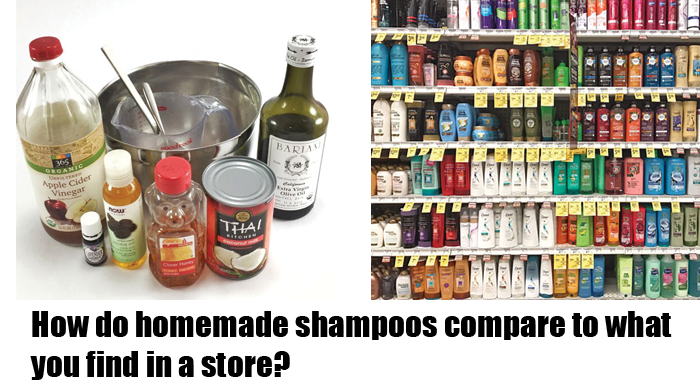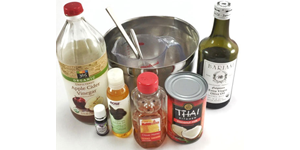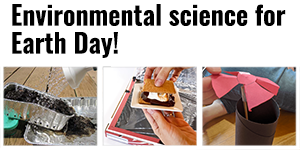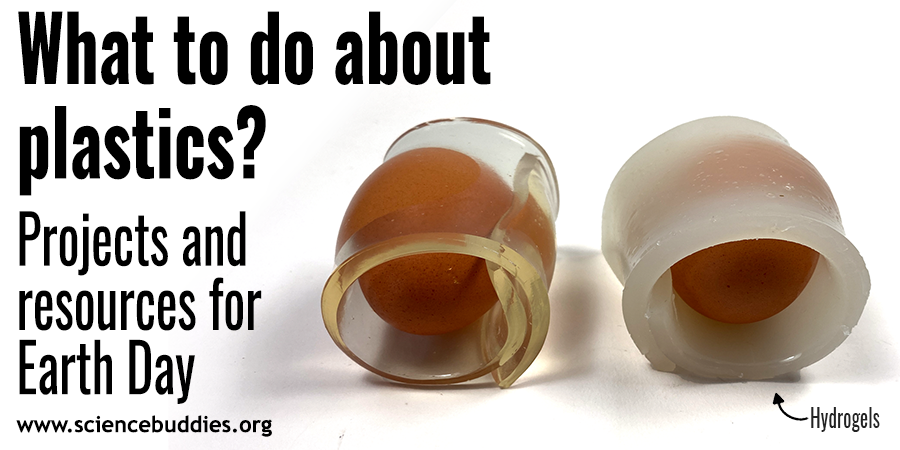Shampoo Science
Do you use store-bought shampoo? Or do you prefer an all-natural product you can make at home? What properties of a shampoo are most important to you? In this chemistry project, students make their own shampoo and put it to the test alongside store-bought shampoo.

No matter where you shop, chances are good that there are dozens of options lining the shelves on the hair care aisle. With shampoos, conditioners, rinses, mousses, gels, and other hair care products, hair care is an industry valued at more than 80 billion dollars. When it comes to shampoo, alone, consumers have many choices, and product marketers spend a great deal of time and money trying to attract the attention of buyers. Packaging choices (like brightly colored bottles), product names, and product descriptions are all designed to try and catch a buyer's interest and, ultimately, money. Some shampoos claim to be more foamy, more gentle, more moisturizing, more natural, or more cleansing. Some shampoos have special fragrances or combinations of ingredients. Products vary in price, too, which may leave you wondering if more expensive shampoos are actually better than budget-friendly choices.
A Natural Alternative
While many people get caught up in choosing between options at the store, there are also people who refuse to use commercially-produced products and instead seek out or make their own alternative natural or organic versions. A simple Internet search on "homemade shampoo" turns up more than 13 million results. Clearly not everyone is buying an off-the-shelf shampoo. There are various approaches to making DIY shampoo, and many recipes use coconut milk or olive oil.
Is a homemade shampoo as effective as a store-bought shampoo? How can you tell if an expensive shampoo is better than a less expensive one? How can you tell which ingredients are effective in a shampoo and which ones are not? The answers to these questions may depend on what you value most in your shampoo!
Shampoo Smart
When it comes to why they buy or like a certain product compared to another, people respond to a variety of different factors. Someone may choose a product for its fragrance, the way it lathers, the way hair seems to feel or behave after shampooing, how clean hair feels after shampooing, how easy the shampoo is to rinse, how much it costs, what special features it claims to have, or a combination of reasons. Similarly, some people choose a specific product because it is more environmentally sound or more natural, or because of ingredients the product does not include, including certain chemicals or fragrances.
While how well a shampoo cleans may be the biggest factor someone cares about in a shampoo, it probably isn't the only consideration. A shampoo that cleans well but smells awful, for example, might not be as successful as a shampoo that cleans moderately well and smells nice. For someone who prefers a natural shampoo, one without synthetic chemicals, an acceptable ingredients list may be the most important consideration, but the shampoo still needs to do what shampoo should do... remove dirt and oil from hair.
Ultimately, evaluating shampoos is often a personal and subjective process. Science can help provide quantitative results, however, that can help. By running several experiments that compare shampoos in terms of features consumers expect and care about in shampoo, students have the opportunity to better understand product development and the many factors that go into making a successful product that consumers will buy.
In the Make Your Own Shampoo and Test How It Performs! chemistry project, students make two different kinds of homemade shampoo, one with a coconut milk base and one with castile soap. After making their shampoo samples, students do a series of quantitative tests to compare the homemade shampoos to store-bought shampoo. How will the shampoos compare? Which will clean hair best or be able to most effectively remove grease and dirt? What does the pH of each shampoo indicate about how gentle, irritating, or damaging each shampoo may be to the scalp? How well does each shampoo foam? (While foaming doesn't necessarily correlate to effectiveness, many people prefer a shampoo that foams well.) How well does each shampoo make it so that dirt can be rinsed away?
Through a series of tests, students gather data and then analyze their data to determine how each shampoo performs overall. Taking all the tests into consideration, is there a clear winner? Is a homemade shampoo as good as a store-bought shampoo? It may depend on which features you value most in your shampoo, but a closer look at the data may help students better evaluate their options.
Resources to support student exploration of cosmetic chemistry are sponsored by the Astellas USA Foundation.
Categories:
You Might Also Enjoy These Related Posts:
- Plastics and Earth Day - Science Projects
- Arduino Science Projects and Physical Computing
- 10+ Robotics Projects with the BlueBot Kit
- 5 STEM Activities with Marshmallow Peeps
- March Madness Basketball Science Projects: Sports Science Experiments
- Women in STEM! More than 60 Scientists and Engineers for Women's History Month
- Explore Artificial Intelligence and Machine Learning with Student AI Projects
- 10 Reasons to Do the Rubber Band Car Engineering Challenge










